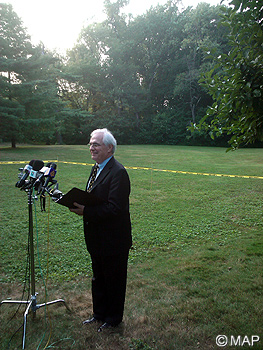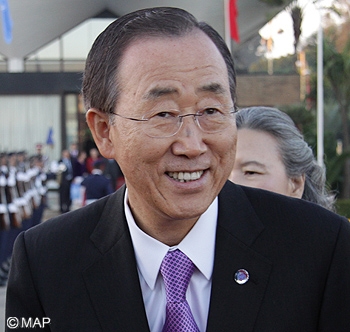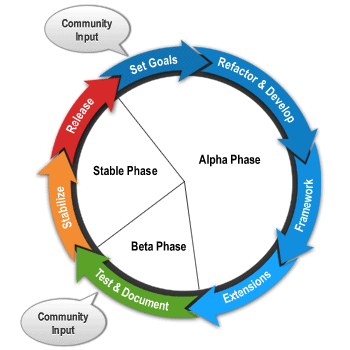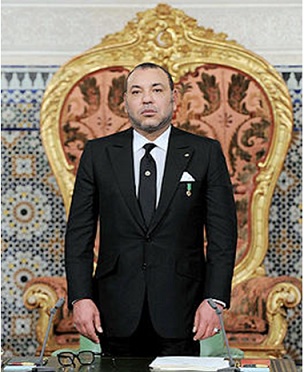Full Text of HM the King’s Speech at Parliament Opening
PERSISMA – Rabat, HM King Mohammed VI delivered, here Friday, a speech before the members of the Parliament’s two houses (the House of Representatives and the House of Advisors) at the opening of the first session of the first legislative year of the tenth legislature.
Here follows the full text of the Royal speech:
Praise be to God
May peace and blessings be upon the Prophet, His Kith and Kin
Ladies and Gentlemen, Distinguished Members of Parliament,
The opening of a legislative year is not just an opportunity afforded by the Constitution to address Members of Parliament. It also provides a platform to address the Government, political parties, the nation’s institutions as well as the citizens.
Not only is this an opportunity to provide guidance – and sometimes to voice criticism – regarding parliamentary and legislative work, but it is also a means whereby I can listen to the concerns and expectations of the citizens whom you represent.
I should like, first, to extend my congratulations to the members of the House of Representatives for the trust placed in them by the citizens to represent them in the legislative institution.
I also want to say that I value the public authorities’ commitment to a keen sense of national responsibility throughout the electoral process.
As the custodian of the nation’s democratic choice, I reaffirm my commitment to the multi-party system, whose foundations were laid down by my revered grandfather, His Majesty King Mohammed V – may he rest in peace –, and which was consolidated by my venerable father, His Majesty King Hassan II – God bless his soul; a system for which earlier generations fought hard.
The first parliamentary term following the adoption of the 2011 Constitution has now come to an end. This was a constitutive term which was characterized by the promulgation of laws for the establishment of several institutions.
The phase which is about to start is even more important than the previous ones. Indeed, it requires that we address, seriously, the real concerns of the citizens, enhance the performance of administrative bodies and improve the services they provide.
Ladies and Gentlemen, Distinguished Members of Parliament,
he goal all institutions should strive to attain is to serve the citizen. Should they fail in that mission, it would mean they serve no purpose and have, as a result, no raison d’être.
As I speak to you and, through you, to all the institutions concerned and to the citizens, I want to raise a question which is of critical importance and which constitutes the very essence of institutional work.
I am referring to the citizen’s relationship with state agencies, whether they are central government departments, local government institutions, elected councils or regional ministerial departments.
By that, I also mean all institutions and bodies related to investment and encouraging businesses, even those involved in providing the most basic services to the citizens, whatever their nature.
The goal is the same: to enable the citizen to obtain the services he needs in the best conditions and shortest time frame, to simplify procedures and to make sure that services are readily available to the citizens and that institutions are accessible to them.
If all matters have to go through central government departments in Rabat, then what is the use of decentralization, of regionalization and of devolution, which we have been striving to achieve since the 1980s?
Managing the citizens’ affairs and serving their interests are both a national responsibility and a sacred trust, and in this regard there is no room for negligence or procrastination.
Regrettably, some people take advantage of the mandate granted to them by the citizens to run public affairs, giving precedence to personal and party interests over public interest, for electoral considerations.
By doing so, they fail to realize that what counts the most in elections is the citizen – not the candidate or the political party; they also erode the values underpinning lofty political action.
If these people do not want to do their job and do not care about the citizens’ interests, be it at the local, regional or even national levels, why do they get involved in politics?
True commitment to political and party principles means one should put the citizen above all other considerations; it means one should fulfil the promises made to the citizen and show dedication in serving him or her, making those promises prevail over any party or personal interests.
Because the efficiency of state agencies is a yardstick of a nation’s progress, and until the citizen’s relationship with them improves, Morocco will continue to be classified as a Third World country, or even Fourth or Fifth World country.
Ladies and Gentlemen, Distinguished Members of Parliament,
There is much talk about citizens meeting the country’s King and seeking his assistance to solve countless problems or to overcome difficulties.
Some people do not understand why citizens seek the assistance of their King to resolve simple problems and issues. What this means, in fact, is that something, somewhere, is not functioning properly.
Naturally, I take pride in interacting directly with citizens and in fulfilling some of their basic needs.
I will continue to do that and to serve my people. The question is: Would citizens ask me to intercede if state agencies did their job?
It goes without saying that citizens resort to me because they find doors shut, or because of some shortcomings in the work of state agencies, or because they want to bemoan some injustice they have suffered.
Ladies and Gentlemen, Distinguished Members of Parliament,
State agencies are suffering from several shortcomings, including weak performance and issues relating to the quality of the services provided to citizens.
They also suffer from an inflated workforce, from the lack of competence and from the absence of a sense of responsibility among many employees.
The civil service basically suffers from a longstanding culture which is widespread among most Moroccans. For many of them, the civil service is a refuge that guarantees them a monthly salary without their having to account for performance.
The official or civil servant who holds public office, or exercises public authority that entrusts him or her with people’s affairs and interests, should at least fulfil public service obligations and seek to help people.
The civil service simply cannot accommodate all Moroccans.
Similarly, access to the civil service should be on the basis of competence, merit and equal opportunity.
Ladies and Gentlemen, Distinguished Members of Parliament,
When dealing with state agencies, citizens face a wide range of difficulties, be it in terms of reception, communication or the processing of files and documents – so much so that in the citizen’s mind, this has come to resemble an obstacle course.
It is not reasonable that a citizen should bear the cost and trouble of going to a government institution – whether it is a consulate, a prefecture, a commune or a regional delegation – especially if he or she is from a far-off region, and find no one to receive him or her, or provide the service needed.
It is unacceptable that a government institution should fail to answer people’s queries or complaints, as if citizens did not matter, or were merely a small part of the administrative landscape.
Without citizens, there can be no state agencies. Citizens are therefore entitled to answers to their letters; they are entitled to solutions to the problems submitted to government bodies. The latter are duty-bound to explain matters to people and to justify decisions, which must be based on the law.
Many citizens complain, for instance, about expropriation issues, either because the State did not compensate them for their property, or because the compensation process took many years and was, therefore, detrimental to their interests, or because the amount of compensation was less than the market price, or for any other reason.
Expropriation should occur only in cases of absolute necessity and in the public interest, with immediate compensation based on market prices applicable on the date of the transaction; procedures for the payment of compensation should also be simplified.
Expropriated land must not be used for any purpose other than the one justifying expropriation; it must not be used for commercial or speculation purposes.
Moreover, citizens often complain about long and complex judicial procedures as well as the failure to enforce sentences, particularly against government institutions.
It is hard to understand how a government department can deprive citizens of their rights whereas, in fact, they should be safeguarding and defending those rights. How can a government official prevent people from enjoying those rights when a final judgment has been pronounced?
It is also unacceptable that state agencies should refuse to pay small and medium businesses what they owe them whereas, in fact, they should be supporting and encouraging those businesses, given the important role they play in promoting development and employment.
Citizens also complain about the abuse of power and influence peddling in state agencies, in addition to the complexity of procedures and long delays in delivering administrative documents.
It is unacceptable that a citizen should have to travel to submit all the papers required for a document and still have to wait for days – sometimes weeks – before he or she can obtain it.
In many consulates, for instance, citizens are not informed of errors in administrative documents because of the lack of follow-up mechanisms, in addition to the complicated procedures required to correct these errors.
As a result, citizens have to bear transportation costs and put up with the trouble of traveling to Morocco to obtain the supporting documents they need to correct those errors. Moreover, there is a lack of coordination between the state agencies concerned, which further delays the delivery of documents.
Among the widespread administrative issues are those relating to the implementation of the Family Law, resulting in family and social problems.
More than twelve years after the introduction of this social reform, there are some who are still unaware of the content of this law, and who do not know their rights and obligations, particularly among the Moroccan community abroad.
I therefore urge the Government and all the administrative and judicial institutions concerned to see to it that this law is properly implemented, to raise public awareness about its content and to amend and update it as may be needed, in order to overcome the problems revealed by practical experience.
Ladies and Gentlemen,
Distinguished Members of Parliament,
A field which clearly illustrates the problems facing the citizens in their dealing with state agencies is that of investment; indeed, there are still hurdles to investment, despite the creation of regional centers and the single window to simplify procedures and speed up the decision-making process.
It is true that, in some cases, investors’ files are incomplete, but instead of helping these investors and proposing solutions to encourage them, matters are made more complicated for them, and additional hurdles and impediments are created.
With such a mentality and attitude, single windows will not be of any use.
I have repeatedly pointed out that problems should be dealt with and files processed on the spot. I have also given my instructions to the Government and asked for the necessary administrative measures to be taken in this regard.
What is the use of the letter I addressed to the Prime Minister in 2002, and what is the use of regionalization, decentralization and devolution if the same old situation remains, and the same old problems persist?
The situation is unacceptable and it should not continue to exist. When an investor receives no reply, or when his problem is not solved, he takes his money back to the bank, if he resides in Morocco.
If the investor is a Moroccan expatriate who chooses to invest in his home country, he has no other alternative but to take his money and go back abroad.
As a result, our country is deprived of opportunities for investment and development. And the citizens are denied employment opportunities.
The single window is but one mechanism to address hurdles to investment.
If no effective solutions are found to it after all these years, then how will the other items mentioned in the letter to the Prime Minister be addressed, namely those pertaining to the relation between citizens and state agencies, the simplification of procedures and the promotion of investment?
Ladies and Gentlemen,
Distinguished Members of Parliament,
Despite the shortcomings of some state agencies, the picture is not all bleak; nor does this mean that those agencies are not discharging their duties. In fact, they have highly professional and technical capabilities, and their performance is improving.
This is clearly evidenced by the major projects being implemented, as well as by the successful national and sectoral policies which have transformed the country, and which have played a prominent role in the progress made in all fields.
Nevertheless, my ambition goes beyond that, and the citizens’ expectations are higher than what government institutions are currently offering. In fact, state agencies need to improve performance to keep up with the progress Morocco is making.
I believe administrative efficiency contributes to promoting development and attracting domestic as well as foreign investment; it also enhances the trust enjoyed by Morocco.
Therefore, I urge everyone – the Government, Parliament, political parties, trade unions, civil society organizations and civil servants – to commit to a keen sense of national responsibility in order to come up with real solutions so as to enhance the performance of state agencies and to improve the quality of the services offered to the citizens.
Administrative reform requires a change of attitudes and mindset as well as quality laws in order to have effective state agencies that serve the citizens.
Considering the current situation, special attention should be given to staff training. Indeed, staff members are the key link in the citizens’ relationship with government institutions. Not only should they be able to work in good conditions, but there should also be incentives for them as well as accountability and sanction mechanisms.
Similarly, e-government services should be offered across the board and in an integrated manner to ensure collective access to information by all sectors and services.
The use of information technology makes it possible to facilitate quick citizen access to services, without having to go to state agencies and interact with the staff, which is the main reason for the prevalence of corruption and abuse of power.
When I laid out my conception of authority, I insisted on the need to combat those phenomena.
Advanced regionalization, which has become a tangible reality, is the basis state agencies should build on to make their services as well as decision-making centers readily available to the citizens.
In this context, I insist on the need to develop and adopt an advanced administrative devolution charter that fits the requirements of the current situation.
All parties and stakeholders are therefore called upon to be actively engaged in the institutional, development-oriented dynamic I am spearheading in the country.
Everyone is responsible for ensuring the efficiency of state agencies and enhancing the quality of the services they provide because they are the backbone of any reform and are critically important for the achievement of the development and progress we want our loyal citizens to benefit from.
“I only desire (your) betterment to the best of my power; and my success (in my task) can only come from Allah. In Him I trust, and unto Him I look”.
True is the Word of God.
Wasslamu alaikum warahmatullah wabarakatuh.




















